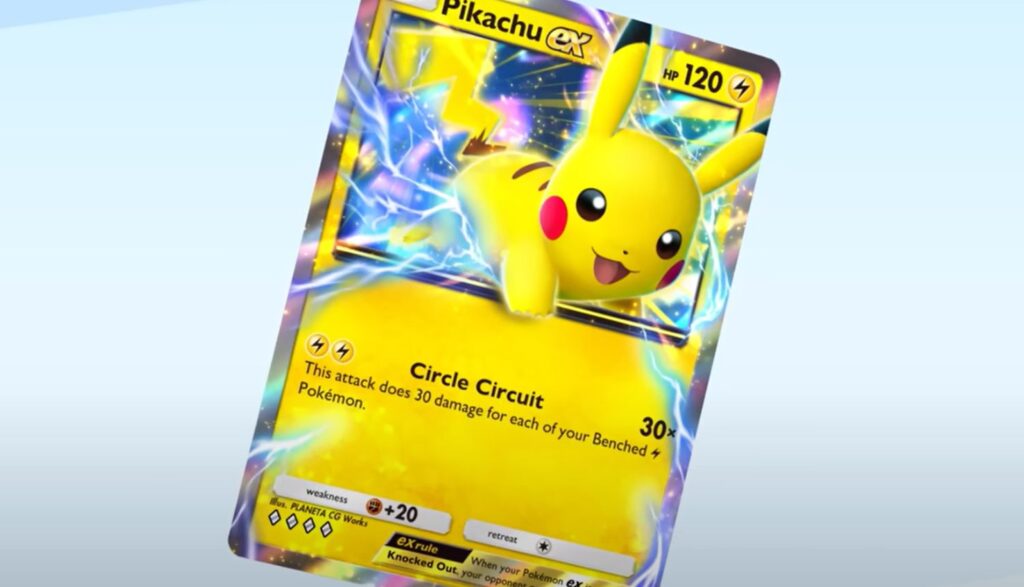
Way back when, in the ancient 1990s, Pokémon video games sailed from Japan to the US shores. And a phenomenon was set loose among young American video gamers who sat clutching a Game Boy console in their mitts.
Those über-popular video games were soon-after adapted into a physical card game. Kids bought packets of random monster cards to build their personalized Pokémon game decks, then jumped into short slap-down-a-card contests at whatever table or Toys R’ Us Pokémon League collective they might find.
The new Pokémon TCG Pocket game combines all those ideas in a free Smartphone app that kids today can carry in their back pocket wherever they go. At least, that’s what the Pokémon Company hopes for.
Oh, and that’s right, it’s free. (But more on that down below.)
Pokémon TCG (Trading Card Game) is essentially made up of two activities: collecting and battling. But if you’re not the competitive type, the game takes care to appeal to those who simply like the idea of opening packets, being surprised by their new pocket monsters, and displaying their collection. Those who’ve played the original card game will attest to the fun side of that.
The game gives you several five-card booster packs to get you started. The concept is, that if you’re patient, you can come back every twelve hours for more free packets to use toward building your first 20-card competitive deck. The decks can be a collection of different complimenting creatures or set up as specific “type” decks.
Those familiar with Pokémon, know that a creature’s strengths and weaknesses are determined by its type, with different types having advantages and disadvantages against each other. So Fire types will have an advantage over Grass types but are weaker against Water types, for example. Building a specifically type-themed deck will give players an advantage in some battles. However, building themed decks from packs of five random Pokémon cards could take some time.
Of course, the Pokémon TCG Pocket game makers don’t want you to give up before you even get started, so they give you scores of early bonuses and rewards to drop your packet-opening wait time to zero and give you more colorful critters to collect.
The game creators also lend you a simple beginner’s deck of Pokémon to compete with, so you get the gist of the battling side of things. If you repeat that packet-opening, Pokémon collecting and easy battling enough, they hope you’ll be hooked.
As far as the competitive side of play is concerned, it mixes a bit of chance—as each turn you draw a new card from your deck—and strategy in deciding which Pokémon, which upgrade or support card to use. The rules here are simplified, so that newbies to the Pokémon world can easily slip in.
Then it’s all about figuring out how to defeat your opponent’s card choices: Three “knockouts” of any kind on your opponent, and you win the match.
This game pits players against both AI and “live” online opponents, so a data-connected Smartphone is required. However, there is no verbal interaction with other online players.
The Pokémon TCG Pocket app is very simple to use, colorful and fun. The battles are between cards so there are no actual Pokémon attacking one another. (It’s really more of a numbers game than anything else.)
There’s a very palpable charm in the collecting and battling process. The contests can be played in short stretches that simply fill times when you’re standing in line somewhere or sitting in a waiting room. And the game is free.
However …
The gamemakers intend to make money. This is called a “gacha” game, which is derived from the Japanese word “gachapon”, referring to a type of toy vending machine.
But you might also read it as “gotcha” since the game makers are relying on players impatience to drive them to spend real-world money. Monetization here comes in two forms: Poké Gold and the Premium Pass.
Poké Gold can be purchased and used to speed things up: buying packets, renting pre-made competitive decks, getting promotional bonuses and the like. The Premium Pass, currently at $9.99 a month, offers up a variety of “Premium Shop” goodies, special cards, customizable items and special battling missions.
It’s all designed to help you get better decks when you become frustrated with your decks that fall short after being matched up against more advanced AI and live players. Spent money increases the chance for another big Pokémon reveal or game victory. And that in turn gives your brain a new shot of dopamine.
There is lots of Poké fun to be had here in short content-free doses. But lock those credit cards away, oh impatient one. Otherwise, this lovely little smartphone game might turn into a different kind of pocket monster—one that goes after your pocketbook.

After spending more than two decades touring, directing, writing and producing for Christian theater and radio (most recently for Adventures in Odyssey, which he still contributes to), Bob joined the Plugged In staff to help us focus more heavily on video games. He is also one of our primary movie reviewers.
Our weekly newsletter will keep you in the loop on the biggest things happening in entertainment and technology. Sign up today, and we’ll send you a chapter from the new Plugged In book, Becoming a Screen-Savvy Family, that focuses on how to implement a “screentime reset” in your family!